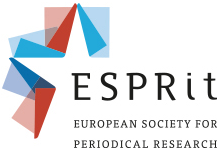CONSTITUTION
ESPRit: European Society for Periodical Research was founded in 2008 and was registered as an association according to Article 2:3 of the Dutch Civil Code in 2018.
ESPRit aims to bring together researchers from different disciplines working in the field of periodical research, and to form a platform to advance periodical research. It seeks to achieve this goal through:
a. Organising an annual conference.
b. Hosting seminars.
c. Supporting the Journal for European Periodical Studies (JEPS) published by the University of Ghent.
d. Circulating information to its members through an email list service.
e. Publishing relevant information for its members on the society website.
f. Awarding prizes to periodical researchers.
Anyone interested in periodical research may become a member of ESPRit by filling in the registration form and paying for the membership fee. Membership can start at any given time during the year. Invoices for the annual membership fee will be sent out annually on the date of first registration.
Members are expected to abide by the Internal Regulations of the Society, and by means of this article implicitly to the Statutes of ESPRit.
